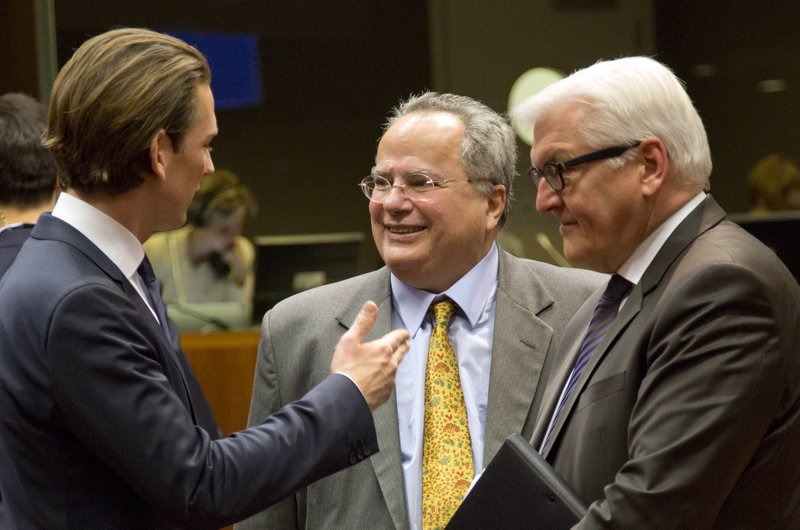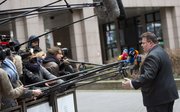BRUSSELS -- The European Union extended by six months an existing set of sanctions against Russian officials and pro-Russia separatist officials because of the continued fighting in eastern Ukraine, and officials said Thursday that they were planning further action.
"We have shown that the EU is ready to take further measures," EU foreign affairs chief Federica Mogherini said.
The new leftist government in Greece didn't immediately support plans for further actions against Russia and insisted a statement against Moscow should be toned down first.
Greek Foreign Minister Nikos Kotzias said there was no direct reference to Russian responsibility for the new developments in Ukraine in the joint statement and "the main thing that we wanted removed, and over which there was a two-hour battle, was the proposal for new sanctions."
Instead of mentioning the threat of new economic sanctions, the joint statement only mentioned "any appropriate action" was on the table for the Feb. 12 EU summit of government leaders.
France and some others said that while firmness was essential, room for negotiation had to be kept open.
Kotzias said Greece believes that new sanctions won't bear fruit, and questioned whether the EU wanted to crush Russia, "resulting in pain for the whole of Europe."
"Sanctions haven't worked anywhere, except for countries in the process of collapse," Kotzias said. "Also, when you impose sanctions, you should know what consequences they will have. For example, the sanctions created financial problems for Greece."
Mogherini said that on top of Thursday's decision to extend the first batch of sanctions against about 130 people, the EU also was preparing a list of new officials to be put on the visa ban and asset-freeze program, which could be confirmed as soon as Feb. 9.
"We hope that this can help in putting pressure, in particular on Russia, to make positive steps and prevent the negative steps that we have seen in the recent days," Mogherini said.
White House spokesman Josh Earnest said "one might reasonably conclude" that the U.S. is considering additional sanctions on Russia, though he said there were no specific plans to announce at this time.
He said the White House was in close contact with European counterparts.
Last March, the EU imposed the first visa bans and asset freezes against officials linked to Russia's annexation of southern Ukraine's Crimean peninsula.
The measures were to expire this March, and Thursday's decision will extend them until at least September.
Pressure for more action has been building since last weekend's attacks on Mariupol, when rockets crashed into a densely populated eastern Ukrainian district, killing 30 and wounding several dozen.
International observers said a preliminary assessment indicated that the attack had been mounted from rebel-held areas.
Since Russia's annexation of Crimea, the EU has steadily increased restrictive measures. In July, the EU imposed economic sanctions that, combined with the drop in oil prices, have stung Moscow.
Meanwhile, Russia has extended its walkout from Europe's human-rights watchdog after again losing its right to vote over the conflict in eastern Ukraine.
The Parliamentary Assembly of the Council of Europe, meeting in the French city of Strasbourg on Wednesday, voted to renew sanctions against Russia at least until April. Russian delegate Alexei Pushkov said Thursday that his delegation's walkout from the assembly would continue the rest of the year.
Information for this article was contributed by Julie Pace and Nicholas Paphitis of The Associated Press.
A Section on 01/30/2015



